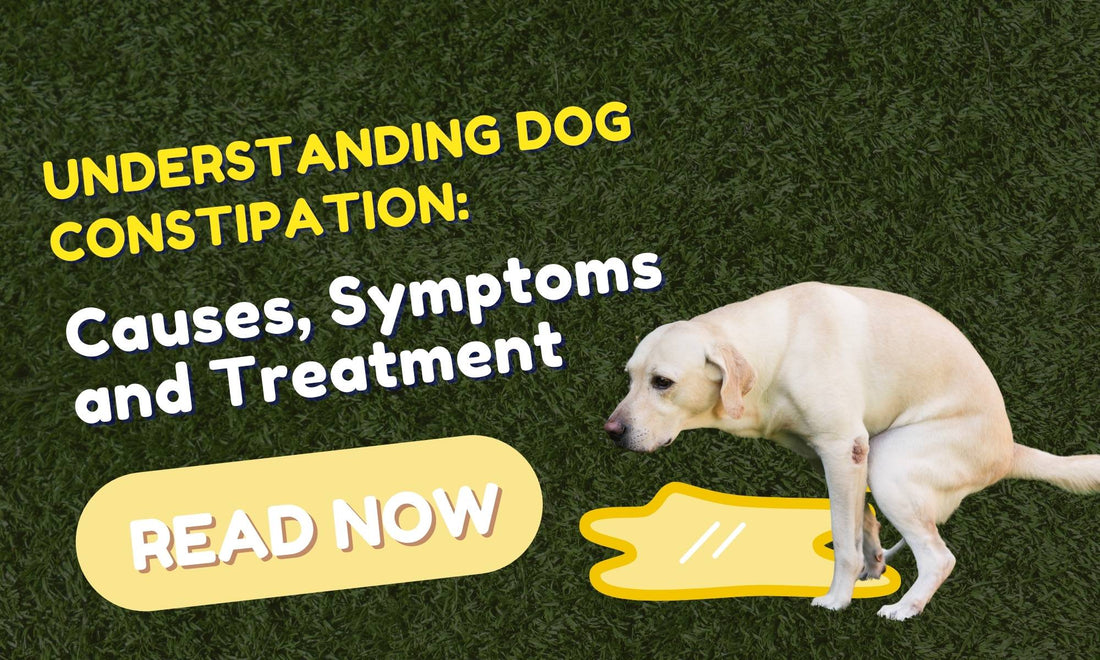What is dog constipation?
Constipation is a common problem that dogs experience. It's when they are unable to produce bowel movements on a regular basis, which for dogs is typically one or two times per day. Signs of constipation include not producing any bowel motions at all, straining to defecate, and producing hard stool.
Unfortunately, in more severe cases, the dog may retain dry fecal matter inside their digestive system, leading to obstipation. Obstipation happens when there is too much compacted fecal matter buildup, causing difficulty during the defecation process.
The good news is there are solutions available that can assist in relieving your canine companion from this discomforting issue, such as introducing stool softeners to help alleviate constipation symptoms so your pet can feel comfortable again soon!

What Are the Symptoms of Dog Constipation?
Constipation in dogs can be easily identified by some clear signs, such as:
• Your dog has not defecated for a few days.
• Producing hard, dry stools that appear like pebbles when you touch them.
Moreover, two other significant indications that your pet is struggling with constipation are Tenesmus and Dyschezia.
Symptoms of tenesmus include futile attempts to defecate, resulting in small amounts of liquefied blood-mixed bowel movements. In contrast, dyschezia involves experiencing painful or challenging processes during defecation.
Dog owners must actively recognize the symptoms associated with constipation. These obvious signals comprise straining to eliminate waste and a lower number of frequent poops than usual. Dry fecal matter leads to decreased appetite and lethargy which might eventually result in vomiting as well.
Do not wait; consult with your veterinarian upon spotting any of these symptoms immediately! Getting early treatment will prevent further complications from happening with a time-based treatment regimen tailored specifically towards each individual case depending on severity levels and underlying conditions presenting at the moment.
What are the Causes of Dog Constipation?
Constipation in dogs can be caused by a number of factors. Some of the most common reasons are as follows:
Dehydration: If dogs do not drink enough water, their feces may become solid and difficult to pass.
Diet: Constipation can be caused by feeding your dog a diet heavy in fat or lacking in fiber.
Lack of exercise: Exercise is necessary for regular bowel motions. Constipation might occur if your dog does not receive enough activity.
Medications: Opioids, antacids, and diuretics, among others, can induce constipation in dogs.
Medical conditions: Constipation in dogs can be caused by medical illnesses such as tumors, anal gland abnormalities, and neurological disorders.
What To Do If Your Dog Is Constipated?
If you notice that your dog is constipated, there are a few home remedies that can help resolve mild and acute cases. However, before administering any supplements for relief, it's essential to consult with your veterinarian.
Although each case differs from the other in dogs' digestive tracts, some tried-and-true methods have worked wonders among pet owners over the years. Some common practices involve dietary changes, as listed below:
• Pumpkin is an excellent source of fiber and moisture, which makes it ideal for treating both diarrhea and constipation issues when added to food.
• Canned dog food contains high levels of water content, allowing regulation within the gastrointestinal system.
• Powdered fiber supplements also provide ample amounts of nutrients needed to support robust digestion.
• Herbal supplements like ginger or powdered psyllium seeds may offer constipation benefits, while olive oil acts as a lubricant, helping fecal matter pass out easily.
• Hydration by providing fresh, clean water access hydrates their bowels, maintaining optimal functionality; adding electrolytes ensures important minerals aren't lacking.
Furthermore, exercising your furry friend allows muscle movement within the digestive tract, aiding regular bowel movements.
For severe symptoms, stool softeners come into play, with clinically proven formulas ensuring rapid results! Again, always check with your vet, who serves only on a prescription basis upon identifying individual needs depending on the severity level present.
When To Take a Constipated Dog to the Vet
If you suspect that your dog is constipated or showing any signs of discomfort while eliminating waste, seek veterinary care immediately.
Chronic constipation often leads to obstipation, in which fecal matter builds up and sticks to the colon. Megacolon arises due to chronic constipation, resulting in an inability among dogs to attempt defecation normally, whereby the bowel loses its ability to move stool out correctly.
Make sure you prepare before visiting a veterinarian with as much information as possible about:
• Your pet's last regular bowel movement.
• Examine stool color regularly, noting consistency.
• Changes within their daily routine or food habits.
• If they ingest non-food items, anything from bones to toys and playthings, even kitty litter, it can become problematic.
• Associated signs of uneasiness, such as straining during the elimination process with pain.
• Prescription drug treatments are being administered simultaneously for other underlying health conditions.
• Any related injuries recently sustained.
• Other instances where vomiting, lethargy, or bloated features exist.
A thorough vet examination includes multiple diagnostic tests, including abdominal palpation and rectal examinations. Examinations like radiographs are useful non-invasively in helping identify obscurities present; barium enemas help remove stubborn obstructions, giving clarity on the condition; and ultrasounds provide images using sound waves rather than radiation exposure methods seen via x-rays.
Complete blood count (CBC) and urine analysis provide comprehensive results that address future levels of need for treatment programs, which are closely monitored throughout. Finally, identifying neurological symptoms exists ensures proper instructions are given regarding aftercare outlined in the safest tailored individual prescription requirements, along with a lengthier yet heightened success-rate methodology approach defined by owner and vet collaboratively working together!
Treatment of Dog Constipation
Treatment for dog constipation depends on the severity of the condition. Here are some of the most common treatments:
Increase water intake: Encourage your dog to drink more water to soften their stools and ease bowel movements.
Increase fiber intake: Adding fiber to your dog's diet can help regulate bowel movements. Some good sources of fiber include pumpkin, sweet potatoes, and green beans.
Exercise: Regular exercise can help improve bowel movements.
Medications: Your veterinarian may prescribe medications such as stool softeners or laxatives to help your dog pass stools more easily.
Enemas: In severe cases of constipation, your veterinarian may need to administer an enema to help your dog pass stools.
Prevention of Dog Constipation
Preventing dog constipation is relatively easy. Here are some tips to keep your dog's digestive system healthy:
• Feed your dog a balanced diet that's high in fiber.
• Encourage your dog to drink plenty of water.
• Exercise your dog regularly to promote bowel movements.
• Monitor your dog's bowel movements and consult with your veterinarian if you notice any changes.
In conclusion, dog constipation is a common condition that can cause discomfort and pain for your furry friend. Understanding the causes, symptoms, and treatment of dog constipation is essential for pet owners. If you notice any signs of constipation in your dog, it's important to consult with your veterinarian immediately.



